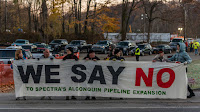Nine climate activists are facing charges in New York state for an act of civil disobedience. One day in November they blocked the entrance to a parking lot in Montrose, N.Y., where work is being done on a major natural gas pipeline expansion, the Algonquin Incremental Market (AIM) Project. Now they plan to defend themselves in court on the grounds that their actions were necessary to protect humanity from climate disruption. Consider it a form of self-defense.
The Montrose 9, as they’re calling themselves, are following in the footsteps of the Delta 5, a group activists who blocked an oil train in Washington state. Earlier this year, the Delta 5 became the first defendants to present at trial a so-called “necessity defense” related to climate change or fossil fuels. The judge in their case did not ultimately allow the jury to consider the necessity arguments when rendering a verdict, but the Delta 5 plan to use the defense again when they appeal their case to a higher court.
And now the Montrose 9 could become the second group to present a climate necessity defense in court. Their trial had originally been scheduled to start on Feb. 3, but it has been indefinitely delayed.
The AIM Project is an expansion of an existing Algonquin Gas Transmission Pipeline system, owned by Spectra Energy. The company wants to build a larger, more heavily pressurized pipeline that would allow it to carry natural gas from the fracking fields of Pennsylvania to New England, via Westchester County, just north of New York City. Spectra says this would serve gas-fired power plants in Connecticut, Rhode Island, and Massachusetts, but activists believe the company’s ultimate goal is to connect with pipelines to Canada or export the gas overseas via liquefied natural gas terminals. The Federal Energy Regulatory Commission (FERC) has already approved the project, and rejected activists’ requests for a stay and a rehearing.
The Montrose 9 are far from the only ones trying to block or at least slow down the pipeline’s construction. Activists from communities in all four affected states — New York, Connecticut, Rhode Island, and Massachusetts — are taking action on every possible level. They’re calling on state governments to revoke construction permits. They’re pressuring local elected officials to express opposition to the pipeline expansion. They’re holding press conferences. They’re staging sit-ins.
And, because those tactics probably won’t succeed on their own, a number of the activists are turning to direct action, like the Montrose 9 did. In Rhode Island, for example, Fighting Against Natural Gas (FANG), a grassroots organization based in Providence, has sponsored a number of acts of civil disobedience to protest Spectra’s expansion of a compressor station alongside the pipeline in Burrillville, R.I. In May, FANG cofounder Sherrie Anne Andre sat in a nearby tree that was going to be cut down to make way for the project, stopping work for a day. In August two FANG activists chained themselves to a fence outside the compressor station. In September, three FANG activists locked themselves to construction equipment at the station. Each time, they were forcibly removed by police and arrested. In December FANG held a 100-person march to oppose the larger compression station and the whole AIM Project. “We’re trying to come up with any creative approach we can,” says FANG cofounder Nick Katkevich. Counterparts in Massachusetts and Connecticut are doing the same.
It’s no wonder that citizens along the pipeline route are up in arms. Living near a pipeline carries risks, and the bigger the pipeline, the bigger those risks. As ProPublica reported in 2012, “Since 1986, pipeline accidents have killed more than 500 people, injured over 4,000, and cost nearly seven billion dollars in property damages.” There are more than 2.5 million miles of fuel pipelines in the U.S., so that’s a relatively low accident rate. But no one wants to be the unlucky person in that statistic.
Read more at Climate Activists and Pipeline Protesters Turn to Civil Disobedience in the Northeast

No comments:
Post a Comment